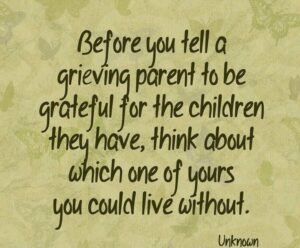
Let’s talk about things you shouldn’t say to a grieving parent after their child has died.
Someone recently said to me, “At least you have two other children and now a grandchild.” Yes, you are right, I am incredibly blessed, beyond blessed. However, it would sure be nice to still have my other son here. Their presence does not somehow mitigate my loss.
I know this person wasn’t saying this to intentionally be mean or hurtful. Grief is awkward and I think sometimes people just don’t know what to say so they say really dumb things. Here’s the biggest piece of advice I can give to you: hug the grieving person and simply say, “I don’t know what to say, just know that I love you.”
See how easy that was? There’s no need to try and fill the space with anything else. I don’t want your advice. I don’t want to hear “he’s in a better place”, “thank goodness you have other children”, “at least you know he’s in heaven”, “you have a guardian angel”, “God has a plan”.
When talking to a grieving parent, if you start any sentence with “at least”, don’t finish it. You are already telling the person that your child’s life didn’t matter in the grand scheme of things.
Don’t ask “how are you?” UGH. I’ve written on this at least a gazillion times. How the heck do you think I am? I lost my child. How would you be feeling? Maybe say instead, “I know this is a really tough time for you right now.”
“I know how you feel.” Really? Even if you have lost a child of your own, everyone grieves differently. You have absolutely no idea how I’m feeling and it’s shameful to say that you do. Claiming that you somehow know how I feel is invalidating.
“Let me know if there is anything I can do for you.” Asking for help is incredibly brave and it takes humans immense amounts of courage to ask for help, let alone a grieving parent who at this point is just trying to get out of bed every day, much less even know what to ask for. The night Nikolai died, I texted one of my best friends in the whole world. As we pulled into our driveway after leaving the hospital that night, she was already there waiting. She sat with me, let me cry, and then promptly went upstairs to change sheets on beds for guests she knew would be coming to my home. She picked up and cleaned. My mom and my sister came that same night. My sister, in her own grief, went to the grocery store in the wee hours of the morning and bought food for our home and her and my mom made our family and guest’s breakfast. These moments of action not words meant the world to me, and it still brings tears to my eyes remembering all that was done for us in those immediate moments. When you are in the immediate stages of grief, doing laundry, running the vacuum, and getting groceries are tasks that take immense energy to even think of doing. Instead of asking what you can do, just tell the grieving person what you will do for them. It’s simply a change from words to action that make all the difference here.
“You’re handling this better than I thought you would.” Gah. Just stop it. People put up fronts for others every single day. Would you rather I drop to my knees and sob and scream? I could and probably should, but I’m putting on a brave face to save YOU from the awkwardness. Again, you have absolutely no idea how I’m feeling or how I’m handling the death of my child – how dare you presume anything.
And for the love of all that is holy, do not choose to not say anything. This is almost worse than anything else you could say. By not saying anything, by not acknowledging the loss, you are telling the grieving person that you don’t matter, that your loss doesn’t matter, the life that was lost didn’t matter. I am here to tell you that Nikolai mattered. He had a whole lot of people that loved him and wishes he were still here. I know that it’s awkward and you don’t know what to say but saying nothing… it’s just not cool. A simple card, text or email that acknowledges the death and simply says “I have no words, just know that I am thinking about you,” speaks volumes to the grieving person.
When someone you care about is grieving, it is human nature to try to comfort them and help ease their pain. However, sometimes our good intentions can be more harmful than helpful, particularly the things we often say with the intention to make them feel better.
A large part of the problem is our own discomfort with grief and not knowing how to speak to someone who is grieving. Instinctively, we try to “fix” the hurt and make the pain go away. However, grief is a necessary process that cannot, and should not, be dusted under the rug so that the grieving person can feel good again. Grief sucks. Don’t make it worse by saying something ridiculous to make yourself feel better. If you want to support someone who is grieving, choose words that convey love and care, rather than offering advice and wisdom.
